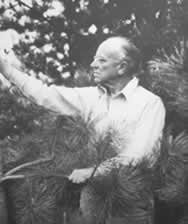Aldo Leopold (U.S. Forest Service)
Connecticut Woodlands, Fall 2011

Aldo Leopold was a hunter. The icon of the environmental movement, the man who taught us not to exploit the land but understand its complexities, wasn’t a bloodthirsty killer. He believed that hunting taught us the struggles of the natural world that humans belong in, whether we choose to see that or not. As a young forester in New Mexico, Leopold killed a mother wolf and her cubs, believing that wolves as a species were bad, echoing the thinking of the time. Watching the mother die shook him. Eventually, he changed his mind about wiping out a predator species.
If Leopold were alive today and could come to Connecticut, he would not tell us to introduce a pack of wolves into Greenwich. He would say that there’s no one answer to this state’s question, “What should we do to keep the deer healthy?”
I have often imagined myself squirming if I could meet Aldo Leopold. He’d tell me I spend way too much time thinking about fun in the backcountry and not enough time engaging with its harshness. He’s right.
On the hunting matter, I think that Leopold might scold those of us who fervently want diverse, natural lands but who wince at the whole business of hunting. He might say that many of us know little about what it takes to survive on the run for a week or two, that we don’t appreciate our food, and that we don’t appreciate the messiness of nature.
He might point out that whether we hunt, eat, or buy animal products—or not—to be human in 2011 is to shape animal habitat.
Take myself: I don’t hunt and weapons make me uncomfortable. As a journalist I’ve tried to stand firmly in the middle on the hunting question. But as a citizen, I’ve killed a lot of animals and failed to think about why all those oppossums, raccoons, birds, cats, and snakes ended up under my wheels.
In the fall 2011 issue of Connecticut Woodlands, I extracted answers, from state hunting staffers, to all of the basic questions about hunting that I’ve been asking for years. I put them down in one place. I hope that this will demystify hunting a bit.
Connecticut holds no true wilderness, but no resident can escape the reality that we live with wild animals whose habitats we’ve interrupted and whose health rides on decisions we make and which our ancestors made.
About This Article
This article and the sidebar are from Connecticut Woodlands magazine, published by the Connecticut Forest & Park Association. I have edited this magazine since 2000. For more about this magazine and CFPA, visit this link.
